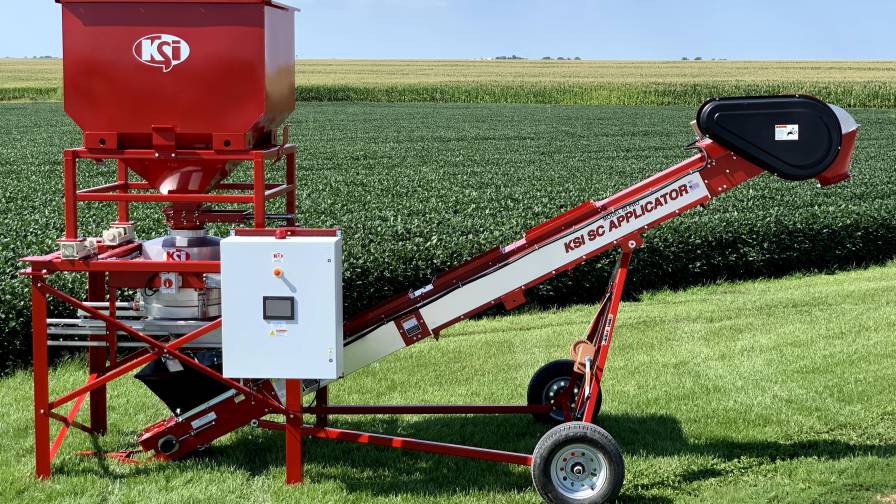Strong Crop Prices, Booming Seed Treatment Business Among Key Factors Boosting Seed Care Equipment Sales
Seed treatment equipment is enjoying a rebound in ’21 as farm customers open up their pocketbooks again on big-ticket items, but, like always, there are sticking points. This year, that happens to be the supply chain troubles that are affecting most every facet of the economy.
USC LLC saw its business double in the past year, driven, in part by a new business approach — direct sales —and booming sales of a field loader conveyor, the AT500, that allows for more gentle handling of seed than an auger.
“I think the biggest surprise is how quickly we saw business turn around,” says Andy Renyer, who co-owns USC with his brother, Jim. He says the turnaround began last September when the company began to see its 12-month rolling order in-take grow. “It’s not stopped since,” he says, adding: “With the optimism (from increasing commodity prices), and the farmer being able to show a positive ROI, it helped them buy equipment they have been waiting on the past three to four years to purchase. I think a lot of it was overdue for an upgrade, but they just didn’t have the capital to pull the trigger.”
Getting back to shows like Farmfest and Dakotafest, Farm Progress, Big Iron, and Husker Harvest in 2021 have been key for USC to reconnect with customers face-to-face and give the company a better feel for the market, Sarah Owens, Marketing Director, explains.
These shows are also where its AT500 conveyor, aimed at overtreating corn and the first-time customer treating seed, made quite the splash. Sixteen months ago, USC had been trying to fi nd distribution via equipment dealers for the conveyors but with many competitors it was difficult to make it work, Renyer says. Instead, the company decided to roll the dice on an unconventional tactic: selling at online auctions, such as Del Peterson and Big Iron. It worked.
“It is very surprising to the end customers to see brand new equipment show up on these auctions. It’s a very unique strategy we tried, and it’s worked out,” he says. “We’re finding all kinds of new customers in the industry with that strategy.”
One important change it also made in the past year, Renyer says, is switching over to a direct sales model. The approach has been a good fit for the company, allowing it to stay in touch with influencers who play a big role in equipment purchases, take out a layer of communication and therefore, lessen the room for error, Owens adds.
The supply chain, however, has “been a disaster,” Renyer concedes. Adequate inventory in the channel kept the industry supplied through 2020, but by ’21, that inventory was depleted. Steel prices more than doubling haven’t helped.“
Every day, our engineers are not spending time designing new innovative equipment solutions; they are spending time trying to find parts and pieces that will fit to make up for parts we can’t get,” he explains. “New innovations are going to be very short in the next 12 months as this supply chain issue probably is going to get worse.”
KSi, Agrilead Developments
At KSi, Rick Smith, Director of Marketing, says that the supply chain woes have forced it to pass on inevitable surcharges, but on the whole, it has managed well as many vendors ordered well ahead of time.
“We’re hitting the numbers that we need to hit — I think there has been a little bit of optimism that’s come back. We’re not just getting people who are looking and can’t do anything about it,” he says.
Last year, the company introduced its SC Applicator Series, which Smith describes as a breakthrough in seed treatment technology thanks to its versatility and economy: it uses the same tried and true, patented KSi atomizer used with its 4808NGA Applicator, and from there allows the seed to be treated with the gentle handling and mixing action of KSi’s patent-pending static mixing conveyor. “With the SC Applicator you can treat some commodities that you wouldn’t want to do in a drum or an auger treater. That’s opened up some options,” Smith says, adding, “At KSi, we have a reputation of building and bringing innovative professional products to the ag retail industry. We’re continuing to build on that reputation and the SC Applicator is no different in that case.”
Smith stresses the software advancements KSi has made have been pivotal. By signing on as an Edge Partner, customers upgrade their equipment continuously instead of shelling out a large capital expense for the latest and greatest system. Ag retailers particularly like being able to seamlessly tie the software into their billing systems, he says.
Details on new launches for KSi remain under wraps, but Smith says that the key is bringing value through incremental advancements, no matter how small. “They make life easier and more accurate, and they aren’t always seen or appreciated by a lot of the industry.”
At Agrilead, consumable product sales have increasingly overpowered its seed treatment equipment business, accounting for around 90% of its business. Dry seed finishers have experienced standout growth, bolstered by higher soybean prices, according to Andrew Ochampaugh, Director of Operations and Technical Services. A limited commercial launch of a new dry seed finisher product for soybeans, containing a biological plant growth-promoting component, is coming soon. Agrilead’s consumable product sales and distribution are managed by alliance partner KALO, Inc. of Overland Park, KS.
“As we progress, we’ve come to realize that consumables are a real strength — bringing new technologies to the seed care industry and new ideas. Yet, we want to treat seed correctly,” he says, referring to its push behind Seed Care Pro, its cloud-based seed care management platform.
The company recently collaborated with USC to integrate Seed Care Pro with USC U-Treat v4.0 treating systems. This new functionality empowers seed care operators to organize, manage, communicate, and execute seed treatment applications by sending seed treatment instructions directly to the USC treating system from Seed Care Pro and receive treating results back into the management system.
“What we’re aiming to do with USC is help customers be better equipped to efficiently and accurately deliver modern seed care with greater agronomic impact and management control,” Ochampaugh explains, adding, “We’re in interesting times as a country, and it’s more important now than ever to innovate and do things better and more efficiently. We are passionate about that. Our company mantra is, ‘bringing the promise of every seed to life.’ That’s what we try to do and is the focus of our research, innovation, and work every day.”








